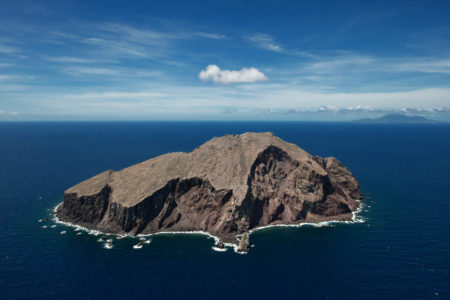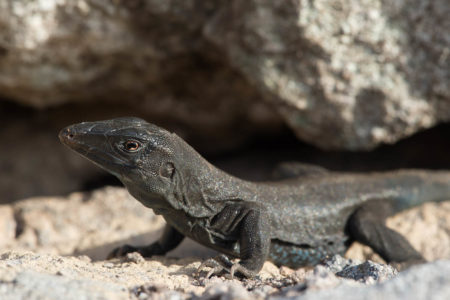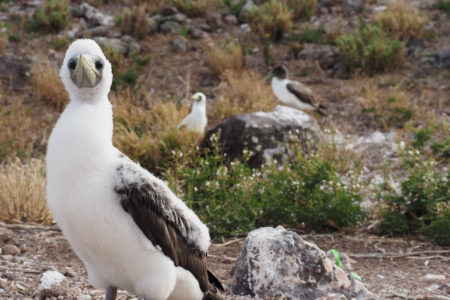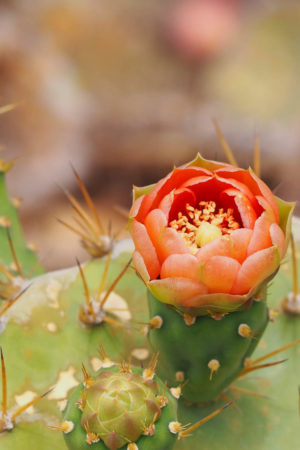
A campaign to remove invasive rats and goats from Redonda has yielded spectacular results for the island’s unique and special wildlife.
The bare, prominent rock rising defiantly from the sea, with its steep, brutal cliffs and lunar-looking landscape – this was Redonda – Antigua & Barbuda’s obscure sister. If conservationists had waved a magic wand, the results could hardly have been more spectacular. Within 12 months of starving goats and thousands of ravenous rats being removed from Redonda, this remote Caribbean island has witnessed a miraculous transformation.
Since the ambitious restoration programme was rolled out, in short time, the rock of Redonda has been transfigured from an inhospitable landscape to a greener haven. More importantly, the unique plants and animals native to this isolated, uninhabited outpost of Antigua and Barbuda are making a rapid recovery after being freed from an alien invasion.
The rat eradication and goat removal work was completed by June 2017, and Redonda was officially declared rat free the following year in July 2018. The entire population of black rats (Rattus rattus) was eradicated using Klerat, a bitter, waxy rat bait that has been used successfully to remove rats from dozens of Caribbean islands since the early 1990s. Klerat was readily eaten by Redonda’s rats but ignored by the native reptiles, mammals and birds. The bait was distributed at intervals of not less than 40 metres, even down the high cliffs, to be certain of reaching every rat. The eradication team lived on the island for more than two months to monitor bait uptake and remove rat carcasses.
The goat operation, which took more than six months, brought the healthiest animals back to Antigua alive. All were thin and stunted due to the lack of food on Redonda, but have since gained weight and begun breeding on Antigua.

Freed from these invasive animals, this uninhabited outpost’s unique native plants and animals are making a rapid recovery. Numbers of the Redonda Ground Dragon, a rare black lizard found nowhere else on the planet, have doubled in number – just one of the many fantastic beasts that have been pulled back from the brink of extinction by removing the predatory black rats and plant-devouring goats.
It doesn’t stop there. In less than a year, numbers of the equally rare Redonda Tree Lizard have tripled, hundreds of new trees have sprung up, land birds have increased tenfold, and the island’s globally important seabird colonies – including Magnificent Frigatebirds and several booby species – are having their best breeding year on record. The now lush and vibrant island is a stark contrast to what we know Redonda to be. A landing helicopter, instead of whipping up clouds of dust now beat down on the gently yielding blades of grass. The dying sister is yet alive!
Speaking on behalf of the Department of the Environment, Dr Helena Jeffery Brown said: “The Government of Antigua and Barbuda considers the return to life of Redonda as a shining beacon in our collective efforts towards ecosystem restoration and biodiversity conservation that will bring us another step closer to attaining some of the Aichi Biodiversity Targets 3.”
The project’s coordinator, Shanna Challenger, of the Environmental Awareness Group (EAG) and Fauna & Flora International (FFI), added: “This has been the opportunity of a lifetime – witnessing the rebirth of an island. Changes forecasted to happen in five years occurred within months. Our conservation efforts really show the benefits of invasive species removal on Caribbean island ecosystems.”
Blood, Sweat, Toil and Teamwork

In conservation, successful outcomes can take years if not decades to materialise, yet spectacular results on Redonda appear remarkably swift. The reality, of course, is that this ‘overnight’ transformation was a long time in the making with months of blood, sweat, toil and – above all – teamwork to catch dozens of nimble goats and remove over 6,000 rats from every inch of Redonda’s rugged terrain. This island makeover involved meticulous planning, ingenuity, and edge-of-the-seat manoeuvres that included abseiling down sheer cliff faces to lay down rat bait and – thanks to the skilled pilots of Caribbean Helicopters Ltd (CHL) – landing equipment in very tight spots.
New Zealand-based Wildlife Management International Limited led the rat eradication team: “We have over 30 years of experience in clearing invasive species from islands,” said ecologist Elizabeth (Biz) Bell, “but having a ground team, rope access team and helicopter team using a combination of bait stations and scattering by hand to successfully target all of the rats makes the Redonda project unique.”
The British Mountaineering Council played a vital role in ensuring that even the steepest cliffs could be reached to lay bait to get to every single rat. Skilled as they were, the volcanic cliffs of Redonda presented an extremely challenging environment for the climbers to operate in.
The safe removal of the malnourished herd of rare-breed feral goats presented an altogether different challenge. The goats were skilled climbers too! Capturing and safely relocating them took much patience and well-thought out plans.
What’s Next for Redonda?

The long list of organisations that cooperated in this mission reflects the complex challenges that had to be overcome. The government of Antigua and Barbuda along with the Environmental Awareness Group and Fauna & FIora International joined forces with leading technical specialists from the UK, USA and New Zealand.
Thanks to their collaborative efforts, Redonda has been rat free for a year, while the feral goats have been rehoused and are being cared for by the government’s Veterinary and Livestock Division on Antigua. Equipment has been installed and protocols have been implemented to prevent future invasions.
Redonda harbours unique species that occur nowhere else in the world and globally important colonies of seabirds. Many argue that Redonda’s unique and special wildlife, coupled with the historical remains of one of the region’s largest guano mines, warrants greater protection for the island. They’re not the only ones. A recent nationwide survey revealed that over 96% of Antiguans and Barbudans agree the island should be protected.
Preparations for designating Redonda and the surrounding sea as a reserve are now under way, led by the Redonda Steering Committee, chaired by the Department of Environment. Commented Dr. Robin Moore from US-based Global Wildlife Conservation, which has supported this project and is now helping with planning for the protected area, “It’s incredible to see this radical and rapid transformation of Redonda from a bare rock to a carpet of vegetation. As plants and animals continue to rebound, this could truly be a showcase sanctuary for wildlife.”
Funding for the Redonda Restoration Programme has been provided by the Darwin Initiative, National Fish & Wildlife Foundation, U.S. Fish & Wildlife Service – Neotropical Migratory Bird Conservation Act, and Global Wildlife Conservation.
By Natalya Lawrence (Environmental Awareness Group & BirdsCaribbean) and Tim Knight (Flora and Fauna International). For more information about the project, visit the Redonda Restoration Programme on Facebook. Hover over each photo in the gallery below to see the caption or click on a photo to see a larger photo and a slide show.
















Congratulations! Good to hear of a success story.
Quel est le coût pour une telle opération, et bravo pour cette réussite
Quel est le coût pour une telle opération, et bravo pour cette réussite
The greening of Redonda is a fantastic achievement! Congratulations to all involved.
Fantastic accomplishment – congratulations!
SO nice to hear from you Judy, thanks!!!
Thanks Tony, it is amazing, isn’t it? Gives us hope for so many areas that have been damaged by invasives.
Merci beaucoup!!!
Thanks Carlos, we need these good news stories for sure, inspires us to do more!!
This is absolutely phenomenal work. A true success story that should help motivate and guide similar initiatives needed on other islands suffering from invasives. Congratulations to absolutely everyone involved.
Thanks, Justin, we agree with you completely, amazing work and a great model for others to follow.